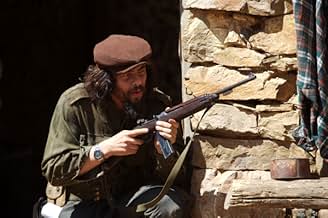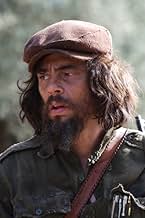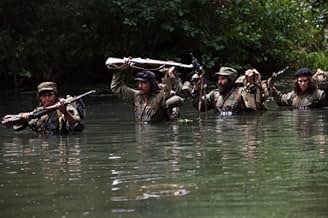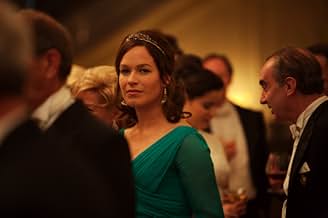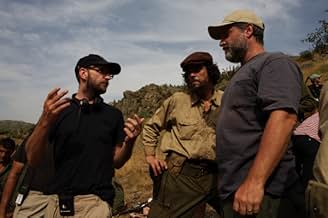PUNTUACIÓN EN IMDb
6,8/10
36 mil
TU PUNTUACIÓN
En 1967, Ernesto 'Che' Guevara lidera un pequeño ejército partidista para librar una desafortunada guerra revolucionaria de guerrillas en Bolivia.En 1967, Ernesto 'Che' Guevara lidera un pequeño ejército partidista para librar una desafortunada guerra revolucionaria de guerrillas en Bolivia.En 1967, Ernesto 'Che' Guevara lidera un pequeño ejército partidista para librar una desafortunada guerra revolucionaria de guerrillas en Bolivia.
- Dirección
- Guión
- Reparto principal
- Premios
- 2 premios y 7 nominaciones en total
Demián Bichir
- Fidel Castro
- (as Demian Bichir)
Reseñas destacadas
Ironically the most talked-about American film in the 2008 New York Film Festival is 98% in Spanish. The extra-long film's controversy began at the Cannes Festival. There were love-hate notices, and considerable doubts about commercial prospects. As consolation the star, Benicio Del Toro, got the Best Actor award there. I'm talking about Steven Soderbergh's 'Che,' of course. That's the name it's going by in this version, shown in New York as at Cannes in two 2-hour-plus segments without opening title or end credits. 'Che' is certainly appropriate since Ernesto "Che" Guevara is in almost every scene. Del Toro is impressive, hanging in reliably through thick and thin, from days of glorious victory in part one to months of humiliating defeat in part two, appealing and simpatico in all his varied manifestations, even disguised as a bald graying man to sneak into Bolivia. It's a terrific performance; one wishes it had a better setting.
If you are patient enough to sit through the over four hours, with an intermission between the two sections, there are rewards. There's an authentic feel throughout--fortunately Soderbergh made the decision to film in Spanish (though some of the actors, oddly enough in the English segments especially, are wooden). You get a good outline of what guerrilla warfare, Che style, was like: the teaching, the recruitment of campesinos, the morality, the discipline, the hardship, and the fighting--as well as Che's gradual morphing from company doctor to full-fledged military leader. Use of a new 9-pound 35 mm-quality RED "digital high performance cine camera" that just became available in time for filming enabled DP Peter Andrews and his crew to produce images that are a bit cold, but at times still sing, and are always sharp and smooth.
The film is in two parts--Soderbergh is calling them two "films," and the plan is to release them commercially as such. First is 'The Argentine,' depicting Che's leadership in jungle and town fighting that led up to the fall of Havana in the late 50's, and the second is 'Guerrilla,' and concerns Che's failed effort nearly a decade later in Bolivia to spearhead a revolution, a fruitful mission that led to Guevara's capture and execution in 1967. The second part was to have been the original film and was written first and, I think, shot first. Producer Laura Bickford says that part two is more of a thriller, while part one is more of an action film with big battle scenes. Yes, but both parts have a lot in common--too much--since both spend a large part of their time following the guerrillas through rough country. Guerrilla an unmitigated downer since the Bolivian revolt was doomed from the start. The group of Cubans who tried to lead it didn't get a friendly reception from the Bolivian campesinos, who suspected foreigners, and thought of the Cuban communists as godless rapists. There is a third part, a kind of celebratory black and white interval made up of Che's speech at the United Nations in 1964 and interviews with him at that time, but that is inter-cut in the first segment. The first part also has Fidel and is considerably more upbeat, leading as it does to the victory in Santa Clara in 1959 that led to the fall of the dictatorship of Fulgencio Batista in Cuba.
During 'Guerilla' I kept thinking how this could indeed work as a quality European-style miniseries, which might begin with a shortened version of Walter Salles's 'Motorcycle Diaries' and go on to take us to Guevara's fateful meeting with Fidel in Mexico and enlistment in the 26th of July Movement. There could be much more about his extensive travels and diplomatic missions. This is far from a complete picture of the man, his childhood interest in chess, his lifelong interest in poetry, the books he wrote; even his international fame is only touched on. And what about his harsh, cruel side? Really what Soderbergh is most interested in isn't Che, but revolution, and guerrilla warfare. The lasting impression that the 4+ hours leave is of slogging through woods and jungle with wounded and sick men and women and idealistic dedication to a the cause of ending the tyranny of the rich. Someone mentioned being reminded of Terrence Malick's 'The Tin Red Line,' and yes, the meandering, episodic battle approach is similar; but 'The Thin Red Line' has stronger characters (hardly anybody emerges forcefully besides Che), and it's a really good film. This is an impressive, but unfinished and ill-fated, effort.
This 8-years-gestating, heavily researched labor of love (how many more Ocean's must come to pay for it?) is a vanity project, too long for a regular theatrical release and too short for a miniseries. Radical editing--or major expansion--would have made it into something more successful, and as it is it's a long slog, especially in the second half.
It's clear that this slogging could have been trimmed down, though it's not so clear what form the resulting film would have taken--but with a little bit of luck it might have been quite a good one.
If you are patient enough to sit through the over four hours, with an intermission between the two sections, there are rewards. There's an authentic feel throughout--fortunately Soderbergh made the decision to film in Spanish (though some of the actors, oddly enough in the English segments especially, are wooden). You get a good outline of what guerrilla warfare, Che style, was like: the teaching, the recruitment of campesinos, the morality, the discipline, the hardship, and the fighting--as well as Che's gradual morphing from company doctor to full-fledged military leader. Use of a new 9-pound 35 mm-quality RED "digital high performance cine camera" that just became available in time for filming enabled DP Peter Andrews and his crew to produce images that are a bit cold, but at times still sing, and are always sharp and smooth.
The film is in two parts--Soderbergh is calling them two "films," and the plan is to release them commercially as such. First is 'The Argentine,' depicting Che's leadership in jungle and town fighting that led up to the fall of Havana in the late 50's, and the second is 'Guerrilla,' and concerns Che's failed effort nearly a decade later in Bolivia to spearhead a revolution, a fruitful mission that led to Guevara's capture and execution in 1967. The second part was to have been the original film and was written first and, I think, shot first. Producer Laura Bickford says that part two is more of a thriller, while part one is more of an action film with big battle scenes. Yes, but both parts have a lot in common--too much--since both spend a large part of their time following the guerrillas through rough country. Guerrilla an unmitigated downer since the Bolivian revolt was doomed from the start. The group of Cubans who tried to lead it didn't get a friendly reception from the Bolivian campesinos, who suspected foreigners, and thought of the Cuban communists as godless rapists. There is a third part, a kind of celebratory black and white interval made up of Che's speech at the United Nations in 1964 and interviews with him at that time, but that is inter-cut in the first segment. The first part also has Fidel and is considerably more upbeat, leading as it does to the victory in Santa Clara in 1959 that led to the fall of the dictatorship of Fulgencio Batista in Cuba.
During 'Guerilla' I kept thinking how this could indeed work as a quality European-style miniseries, which might begin with a shortened version of Walter Salles's 'Motorcycle Diaries' and go on to take us to Guevara's fateful meeting with Fidel in Mexico and enlistment in the 26th of July Movement. There could be much more about his extensive travels and diplomatic missions. This is far from a complete picture of the man, his childhood interest in chess, his lifelong interest in poetry, the books he wrote; even his international fame is only touched on. And what about his harsh, cruel side? Really what Soderbergh is most interested in isn't Che, but revolution, and guerrilla warfare. The lasting impression that the 4+ hours leave is of slogging through woods and jungle with wounded and sick men and women and idealistic dedication to a the cause of ending the tyranny of the rich. Someone mentioned being reminded of Terrence Malick's 'The Tin Red Line,' and yes, the meandering, episodic battle approach is similar; but 'The Thin Red Line' has stronger characters (hardly anybody emerges forcefully besides Che), and it's a really good film. This is an impressive, but unfinished and ill-fated, effort.
This 8-years-gestating, heavily researched labor of love (how many more Ocean's must come to pay for it?) is a vanity project, too long for a regular theatrical release and too short for a miniseries. Radical editing--or major expansion--would have made it into something more successful, and as it is it's a long slog, especially in the second half.
It's clear that this slogging could have been trimmed down, though it's not so clear what form the resulting film would have taken--but with a little bit of luck it might have been quite a good one.
Following directly from where the story left off in part one, the second half which sets about telling the inevitable downfall and much more grim side of the man's legacy is exactly as such. In direct contrast to the first feature, part two represents a shift from Che the pride and glory of a revolutionised country, to Chestruggling liberator of a country to which he has no previous ties. The change of setting isn't just aesthetic; from the autumn and spring greys of the woodlands comes a change of tone and heart to the feature, replacing the optimism of the predecessor with a cynical, battered and bruised reality aligned to an all new struggle. Yet, as Che would go on to say himselfsuch a struggle is best told exactly as thata struggle. While Part One certainly helped document that initial surge to power that the revolutionary guerrilla acquired through just that, Part Two takes a much more refined, callous and bleak segment of Che's life and ambition, and gives it an assertive portrayal that is both poignant and tragic in a tangible, easy to grasp manner.
While the movie's tone in some regards does stray off and differ quite drastically from Part One however, there still remains that same documented approach taken a month ago that avoids melodrama and fabrication as much as possible. This somewhat distant, cold approach to telling Che's story and struggle will no doubt turn some viewers off; indeed, I still remain reserved about whether or not the feature itself should have been named after one manif anything, the entirety of Che, taken as a whole, delivers a tale that goes beyond mere biography and instead documents a man's struggle alongside those who helped carry him along the way. By no means does Soderbergh try to paint a humanistic portrait here akin to what Hirschbiegel did with Der Untergang half a decade ago (excuse the ironic contrast); Che is a slow moving, reserved and meditative approach to telling a history lesson that just happens to be narrated by the one man who arguably- conducted the whole thing.
Yet by moving from the lush green landscapes of Cuba and retreating to the bleak, decaying backdrop of Bolivia for Part Two, the story does inevitably take on a distinctly contrasting tone that doesn't feel too disjointed from its predecessor, but does enough to give it its own reference points. Here, the basic structure of Part One is echoed backthere's the initial struggle, the battles, the fallen comrades and the recruiting of those to replace them, all the while we see some glimpses of the man behind the movement. Yet, as anyone with the vaguest idea of the actual history behind the feature will know, Part Two is destined to end on a much more underwhelming, and disquieting note. This difference, in combination with the similarities to Part One, make a compelling and memorable whole; by all means, both could be digested one their own (and kudos to Soderbergh for achieving as such) and enjoyed as they are, but taken as one statement, Che delivers exactly what it sets out to achieve.
Indeed, everything that made Part One the treat that it was one month prior is still evident here from the subtle yet engrossing performances from the central cast to the slow building, realistically structured combat scenesthe drama inherent to the characters on screen is just as vague and indiscernible, but with a feature such as this, Part Two once again proves that avoiding such elements don't necessarily hurt a film when there is enough plot and reflection on other elements to keep the viewer engaged. In fact, upon writing this review I was at odds as to whether or not to simply add a paragraph or two to my initial review for Part One, and title the review as a whole, yet I felt that to do so would only serve to disillusion those who may sit down to watch the entirety of both films consecutively.
With that said, I cannot rightfully decree whether or not Che holds up to the task of engaging an audience for its sprawling four hour plus runtime, but upon viewing both segments I can at least attest to each part's ability to do just that. With a reflective, intricate screenplay combined with endlessly mesmerising photography and nuanced performances that do justice to the movie's characters without drawing attention to themselves, Che Part Two is every bit as compelling and rewarding as its predecessor, but this time with a tragic but uplifting, reaffirming conclusion fit for the history pages of film.
While the movie's tone in some regards does stray off and differ quite drastically from Part One however, there still remains that same documented approach taken a month ago that avoids melodrama and fabrication as much as possible. This somewhat distant, cold approach to telling Che's story and struggle will no doubt turn some viewers off; indeed, I still remain reserved about whether or not the feature itself should have been named after one manif anything, the entirety of Che, taken as a whole, delivers a tale that goes beyond mere biography and instead documents a man's struggle alongside those who helped carry him along the way. By no means does Soderbergh try to paint a humanistic portrait here akin to what Hirschbiegel did with Der Untergang half a decade ago (excuse the ironic contrast); Che is a slow moving, reserved and meditative approach to telling a history lesson that just happens to be narrated by the one man who arguably- conducted the whole thing.
Yet by moving from the lush green landscapes of Cuba and retreating to the bleak, decaying backdrop of Bolivia for Part Two, the story does inevitably take on a distinctly contrasting tone that doesn't feel too disjointed from its predecessor, but does enough to give it its own reference points. Here, the basic structure of Part One is echoed backthere's the initial struggle, the battles, the fallen comrades and the recruiting of those to replace them, all the while we see some glimpses of the man behind the movement. Yet, as anyone with the vaguest idea of the actual history behind the feature will know, Part Two is destined to end on a much more underwhelming, and disquieting note. This difference, in combination with the similarities to Part One, make a compelling and memorable whole; by all means, both could be digested one their own (and kudos to Soderbergh for achieving as such) and enjoyed as they are, but taken as one statement, Che delivers exactly what it sets out to achieve.
Indeed, everything that made Part One the treat that it was one month prior is still evident here from the subtle yet engrossing performances from the central cast to the slow building, realistically structured combat scenesthe drama inherent to the characters on screen is just as vague and indiscernible, but with a feature such as this, Part Two once again proves that avoiding such elements don't necessarily hurt a film when there is enough plot and reflection on other elements to keep the viewer engaged. In fact, upon writing this review I was at odds as to whether or not to simply add a paragraph or two to my initial review for Part One, and title the review as a whole, yet I felt that to do so would only serve to disillusion those who may sit down to watch the entirety of both films consecutively.
With that said, I cannot rightfully decree whether or not Che holds up to the task of engaging an audience for its sprawling four hour plus runtime, but upon viewing both segments I can at least attest to each part's ability to do just that. With a reflective, intricate screenplay combined with endlessly mesmerising photography and nuanced performances that do justice to the movie's characters without drawing attention to themselves, Che Part Two is every bit as compelling and rewarding as its predecessor, but this time with a tragic but uplifting, reaffirming conclusion fit for the history pages of film.
- A review by Jamie Robert Ward (http://www.invocus.net)
Part One left Che on the road to Havana following the overthrow of the Batista dictatorship; Part Two jumps forward seven years, so that we miss out his time as a Minister in Castro's government and his abortive adventures in the Congo. Compared to the earlier film, this second element of the diptych is much tighter than the first in narrative terms, focusing only on Che's year in Bolivia (1966-67) and takes a straightforward chronological approach.
It has some of the strengths of the first film: the cinematography and direction of Steven Soderbergh, which give the whole work a lifelike, almost documentary feel, and the superb acting of Benicio del Toro who - even more than before - is rarely off the screen. However, the narrative is less compelling this time with the guerrillas seemingly going from one place to another with no obvious strategy. The main criticism of both parts though is that we have over four hours of excessively reverential treatment of an immensely controversial figure with little acknowledgement of the egotism that was at the heart of the doomed Bolivian mission.
It has some of the strengths of the first film: the cinematography and direction of Steven Soderbergh, which give the whole work a lifelike, almost documentary feel, and the superb acting of Benicio del Toro who - even more than before - is rarely off the screen. However, the narrative is less compelling this time with the guerrillas seemingly going from one place to another with no obvious strategy. The main criticism of both parts though is that we have over four hours of excessively reverential treatment of an immensely controversial figure with little acknowledgement of the egotism that was at the heart of the doomed Bolivian mission.
Possibly the most brilliant thing about Che: Part Two, as we begin to integrate it with Part One in our minds, is that there is no clarification of why Che chose to confidentially abscond from Cuba after the revolution, no allusion to his experience in the Congo, no clarification of why he chose Bolivia as his subsequent setting for a coup d'etat, no allusion to the political decisions he made as a young man motorcycling across South America, which Walter Salles has given prominent familiarity. Extraordinary focus is given to Che meeting the volunteers who accompany his guerrilla factions. Yet hardly any endeavor is made to single them out as individuals, to establish involved relationships. He is reasonably unreasonable. Che drives an unbreakable doctrine to leave no wounded man behind. But there is no feeling that he is deeply directly concerned with his men. It is the concept.
In Part 1, in Cuba, the rebels are welcomed by the people of the villages, given food and cover, supported in what grows to be a victorious revolution. Here, in Bolivia, not much understanding is apparent. Villagers expose him. They protect government troops, not his own. When he expounds on the onesidedness of the government medical system, his audience appears uninterested. You cannot lead a people into revolution if they do not want to comply. Soderbergh shows U.S. military advisers working with the Bolivians, but doesn't fault the United States for Che's collapse. Che seems to have just misfigured his fight and the place where he wanted to have it.
In showcasing both wars, Soderbergh doesn't build his battle scenes as actions with specific results. Che's men attack and are attacked. They exchange fire with faraway assailants. There is generally a cut to the group in the aftershock of combat, its death toll not paused for. This is not a war movie. It is about one man's reasonably unreasonable drive to endure. There is no elaborate cinematography. Soderbergh looks firmly at Che's inflexible dedication. There are remarkable sporadic visceral shots, but being few they are all the more powerful, such as Che's POV shot during his final beats. There is an abundance of the terrain, where these men live for weeks at a time, and the all-consuming effect is of languor, Guevara himself having malaria part of the time.
Benicio Del Toro, one of the film's producers, gives a champion's performance, not least because it's modest. He isn't portrayed as the cutting edge like most epic heroes. In Cuba, he arises in conquest, in Bolivia, he falls to the reverse, and occasionally is actually difficult to distinguish behind a tangle of beard and hair. Del Toro illustrates not so much an identity as an attitude. You may think the film is too long. I think there's a genuine cause for its breadth. Guevara's affairs in Cuba and particularly Bolivia was not a sequence of episodes and sketches, but an undertaking of staying power that might virtually be called insane. In the end, Che as a whole or in parts is a commercially ballsy movie, one where its director begins by understanding the limits innate in cinematic biography and working progressively within those means.
In Part 1, in Cuba, the rebels are welcomed by the people of the villages, given food and cover, supported in what grows to be a victorious revolution. Here, in Bolivia, not much understanding is apparent. Villagers expose him. They protect government troops, not his own. When he expounds on the onesidedness of the government medical system, his audience appears uninterested. You cannot lead a people into revolution if they do not want to comply. Soderbergh shows U.S. military advisers working with the Bolivians, but doesn't fault the United States for Che's collapse. Che seems to have just misfigured his fight and the place where he wanted to have it.
In showcasing both wars, Soderbergh doesn't build his battle scenes as actions with specific results. Che's men attack and are attacked. They exchange fire with faraway assailants. There is generally a cut to the group in the aftershock of combat, its death toll not paused for. This is not a war movie. It is about one man's reasonably unreasonable drive to endure. There is no elaborate cinematography. Soderbergh looks firmly at Che's inflexible dedication. There are remarkable sporadic visceral shots, but being few they are all the more powerful, such as Che's POV shot during his final beats. There is an abundance of the terrain, where these men live for weeks at a time, and the all-consuming effect is of languor, Guevara himself having malaria part of the time.
Benicio Del Toro, one of the film's producers, gives a champion's performance, not least because it's modest. He isn't portrayed as the cutting edge like most epic heroes. In Cuba, he arises in conquest, in Bolivia, he falls to the reverse, and occasionally is actually difficult to distinguish behind a tangle of beard and hair. Del Toro illustrates not so much an identity as an attitude. You may think the film is too long. I think there's a genuine cause for its breadth. Guevara's affairs in Cuba and particularly Bolivia was not a sequence of episodes and sketches, but an undertaking of staying power that might virtually be called insane. In the end, Che as a whole or in parts is a commercially ballsy movie, one where its director begins by understanding the limits innate in cinematic biography and working progressively within those means.
In terms of a (loose) description, part one of this two part series covers Ernesto Che Guevara's travels, alongside Fidel Castro, from Mexico to Cuba and his rise, organizing and leading his fighters, finally culminating in Castro's seizure of power in Cuba from Fulgencio Batista. The second film, rather different in tone and spirit from its companion, focuses primarily on his efforts in Bolivia, tracking his gradual downfall Little of Guevara's personal life aside from his activism is detailed, which is both a little surprising and somewhat vexing, especially when one considers the combined duration of both films is well over four hours. There is, of course, nothing inherently wrong with a filmed biography limiting itself to just one or two particular aspects of its subject's diverse life; such an approach can ensure better focus on the material, as opposed to risking the potential the audience may become lost in a rambling, disjointed account in which too few events in the subjects life are explored with adequate depth and clarity.
The pair of films, overall, are most memorable for their sequences of Guevara's guerrilla army training and battling in the jungles and waters of Cuba and Bolivia and especially for the climactic battles near the end of each film. They may each be overlong and not chart as much territory as they perhaps should. Some may wish they would delve further into the obscure intimacies of his life, especially for the benefit of those already familiar with his activism. Others may feel the film does not question his militant means often or strongly enough. No, the films are not perfect, but lesser movies than these have been well received and, as such, these two are worth a look.
The pair of films, overall, are most memorable for their sequences of Guevara's guerrilla army training and battling in the jungles and waters of Cuba and Bolivia and especially for the climactic battles near the end of each film. They may each be overlong and not chart as much territory as they perhaps should. Some may wish they would delve further into the obscure intimacies of his life, especially for the benefit of those already familiar with his activism. Others may feel the film does not question his militant means often or strongly enough. No, the films are not perfect, but lesser movies than these have been well received and, as such, these two are worth a look.
¿Sabías que...?
- CuriosidadesWas the first feature-length movie to be shot with the Red One Digital Camera, as well as the first mainstream film to be shot in the 4K resolution. (Part One was also shot with this camera, but Part Two was shot first so Benicio Del Toro could gradually regain the weight he lost for this film)
- PifiasAt his execution, Che was shot a total of nine times, not three as shown in the movie.
- Citas
Ernesto Che Guevara: To survive here, to win... you have to live as if you've already died.
- Banda sonoraBalderrama
Lyrics by Manuel José Castilla
Music by Gustavo Leguizamon
Performed by Mercedes Sosa
Courtesy of Universal Music
Copyright (c) by Lagos Editorial (Warner/Chappell Music Argentina)
Selecciones populares
Inicia sesión para calificar y añadir a tu lista para recibir recomendaciones personalizadas
- How long is Che: Part Two?Con tecnología de Alexa
- Is there a "Che: Part One"?
- Does this film explain Che's political views and how he adopted them?
- What is the song that plays at the end of the film?
Detalles
- Fecha de lanzamiento
- Países de origen
- Idiomas
- Títulos en diferentes países
- Che: Part Two
- Localizaciones del rodaje
- Empresas productoras
- Ver más compañías en los créditos en IMDbPro
Taquilla
- Presupuesto
- 40.000.000 US$ (estimación)
- Recaudación en Estados Unidos y Canadá
- 748.555 US$
- Fin de semana de estreno en EE. UU. y Canadá
- 61.070 US$
- 14 dic 2008
- Recaudación en todo el mundo
- 8.638.163 US$
- Duración2 horas 15 minutos
- Color
- Mezcla de sonido
- Relación de aspecto
- 1.85 : 1
Contribuir a esta página
Sugerir un cambio o añadir el contenido que falta

Principal laguna de datos
By what name was Che. Guerrilla (2008) officially released in India in English?
Responde

